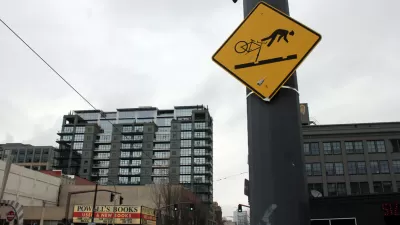In one word: safety. And, as Sarah Laskow explains, the more folks take to riding, the safer the streets become, so it builds on itself. Critical to road safety is bike infrastructure, like protected bike lanes, bike boxes and bike traffic signals.

"Safer biking means that more people (especially women) decide biking’s a good option. More cyclists make for safer streets — and the more people cycle, the more likely it is that city planners think it’s worth putting in bike infrastructure," writes Sarah Laskow, a reporter based in New York City who covers environment, energy, and sustainability issues.
Laskow's blog is based on a "big story" that slipped through the cracks last year, as described by Michael Andersen, Bike Portland News Editor: "Portland had zero bike fatalities — again." That is quite an accomplishment considering that:
- Portland had the highest percentage of commute trips made by bicycle in large cities in the U.S., as we noted in 2012.
- While we await 2013 data, we note that 2012 was not a good year for cyclists and pedestrians according to fatality statistics prepared by the National Highway Traffic Safety Administration (and posted here)
Andersen writes that notwithstanding several serious bike collisions, "the number-one reason Portland is the country's best big city for biking is that this is, compared to any other large U.S. city and lots of the smaller ones, an extremely safe place to ride a bicycle."
What's more, zero bicyclist fatalities is not an aberration, he adds, as "the city also avoided any bike-related fatalities in 1999, 2000, 2002, 2006, 2008 and 2010."
Key to increasing ridership is "using protected [also known as cycletracks] and buffered bike lanes to make big corridors bike-friendlier," though he admits that "Portland has fallen well behind the leading U.S. cities (though it did add 4 miles of new buffered bike lanes in 2013, most prominently a 2-mile stretch of Southwest Beaverton-Hillsdale Highway).
But Portland does still have a solid claim to bike-infrastructure leadership in the United States: its neighborhood greenway network, on which it continues to remove center lines (as it did this year on outer Alberta, inner Ankeny and inner Flint), flip stop signs and install about 1,600 new "20 mph" signs in recognition of the network's new, lower speed limit.
Bike boxes and traffic signals, which as we noted here recently are also in use in Portland, are aimed at reducing collisions where they're most likely to occur - at intersections.
FULL STORY: Portland made it through 2013 with zero bike fatalities

Maui's Vacation Rental Debate Turns Ugly
Verbal attacks, misinformation campaigns and fistfights plague a high-stakes debate to convert thousands of vacation rentals into long-term housing.

Planetizen Federal Action Tracker
A weekly monitor of how Trump’s orders and actions are impacting planners and planning in America.

In Urban Planning, AI Prompting Could be the New Design Thinking
Creativity has long been key to great urban design. What if we see AI as our new creative partner?

King County Supportive Housing Program Offers Hope for Unhoused Residents
The county is taking a ‘Housing First’ approach that prioritizes getting people into housing, then offering wraparound supportive services.

Researchers Use AI to Get Clearer Picture of US Housing
Analysts are using artificial intelligence to supercharge their research by allowing them to comb through data faster. Though these AI tools can be error prone, they save time and housing researchers are optimistic about the future.

Making Shared Micromobility More Inclusive
Cities and shared mobility system operators can do more to include people with disabilities in planning and operations, per a new report.
Urban Design for Planners 1: Software Tools
This six-course series explores essential urban design concepts using open source software and equips planners with the tools they need to participate fully in the urban design process.
Planning for Universal Design
Learn the tools for implementing Universal Design in planning regulations.
planning NEXT
Appalachian Highlands Housing Partners
Mpact (founded as Rail~Volution)
City of Camden Redevelopment Agency
City of Astoria
City of Portland
City of Laramie



























